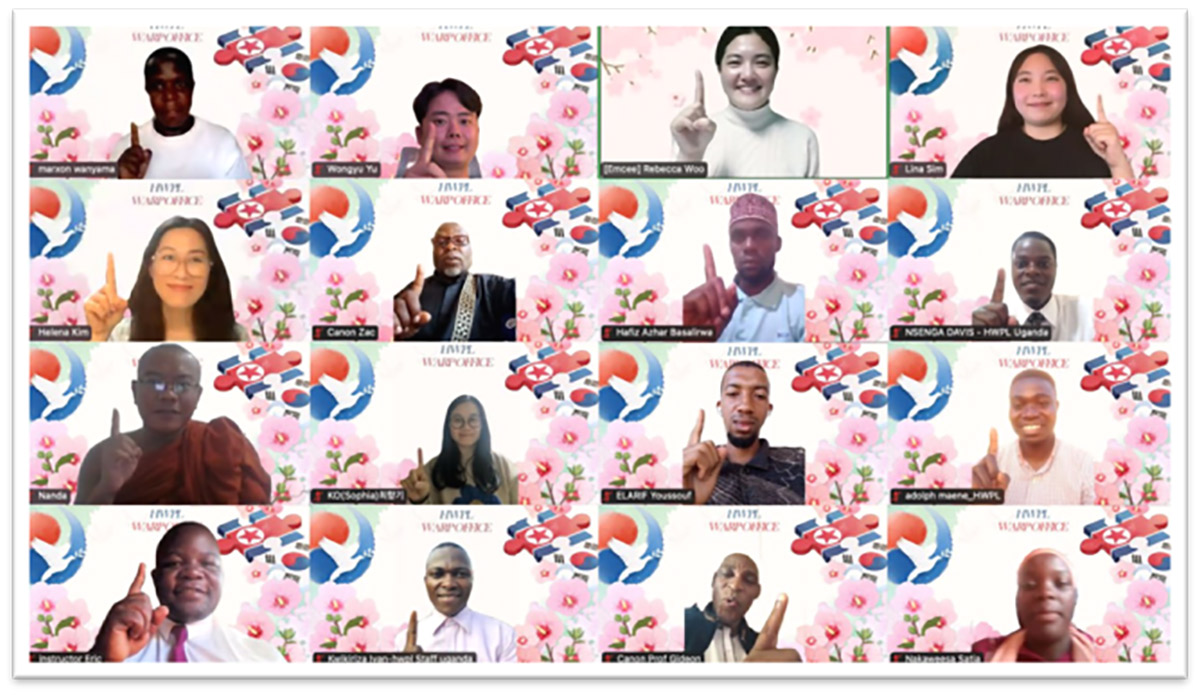[HWPL]
[HWPL] HWPL's WARP Office meeting in Uganda
HWPL WARP Office in Kampala, Uganda
Dialogue with Ugandan Religious Leaders: About the Peaceful Reunification of the Korean Peninsula
On March 29, the HWPL World Alliance of Religions’ Peace (WARP) Office meeting in Kampala, Uganda, was held online. This particular session focused on the theme “About the Peaceful Reunification of the Korean Peninsula.” It aimed to raise awareness that Korea remains the world’s only divided country and to highlight the importance of peaceful reunification to the international community. Religious leaders representing Buddhism, branches of Christianity including Protestantism and Anglicanism, and Islam participated in the dialogue.
Participants deeply resonated with Chairman Man Hee Lee of HWPL’s message: “This is a country and people that our ancestors have passed down to us, so let’s unite and work together.” They agreed on the necessity of interreligious cooperation not only for the peaceful reunification of the Korean Peninsula but also for achieving world peace.
The leaders reaffirmed the original mission of religion—to resolve conflict and foster harmony—and pledged to collaborate based on the shared value of peace that exists across religious teachings.

The discussion centered around three key questions:
Q1. What are your thoughts on the Declaration of Unification, which embodies the spirit of peace? If there are similar teachings on the spirit of peace in your scriptures, please share them with us.
Q2. What role do you believe South Korean religious leaders should play in achieving the peaceful reunification of the Korean Peninsula?)
Q3. Are there teachings in your scripture that warn against division or emphasize the importance of unity and harmony?
Religious leaders shared their thoughts as follows:
Protestantism – Wanyama Tadeo Nanjukhi, Pastor, Revival Palace Center
“The Declaration of Unification by Chairman Lee resonates deeply with the Christian spirit of peace and reconciliation. Its emphasis on dialogue, the well-being of the people, and the importance of religious freedom aligns with core Christian values. The declaration’s call to overcome division and work towards unity echoes the Christian message of breaking down walls of hostility and creating one new humanity.
The Christian scripture, the Bible, teaches peace, which can come from forgiveness. This teaching challenges believers to extend love and seek reconciliation even with those who are hostile, a principle crucial for overcoming division.
This means that Christian leaders have a crucial role to play in the peaceful reunification of the Korean peninsula. They need to meet face-to-face, begin dialogue and work to break down the walls of hatred and mistrust that have been built up by decades of division in order to set the foundations for reunification.”
Buddhism – Venerable Nanda Siam, Monk, Wat Moha Montrey
“The leaders of each country should have compassion and sympathy for the suffering of the people due to war and conflict. If they do not understand their suffering, the situation of division due to their own greed will persist. The Buddha said to be at peace with one another, so if they know the value of peace and discuss peace, a peaceful unification of the Korean peninsula will be achieved.”
The dialogue went beyond the topic of peaceful unification of the Korean Peninsula and served as an opportunity to remind the world of the role religions should play in conflict resolution and peacebuilding. In particular, Ugandan religious leaders shared the possibility of realizing peace through inter-religious solidarity and cooperation in their own nation and around the world.
HWPL Official Homepage







In a world where wars and conflicts abound, the need for peace is of utmost importance
ReplyDelete